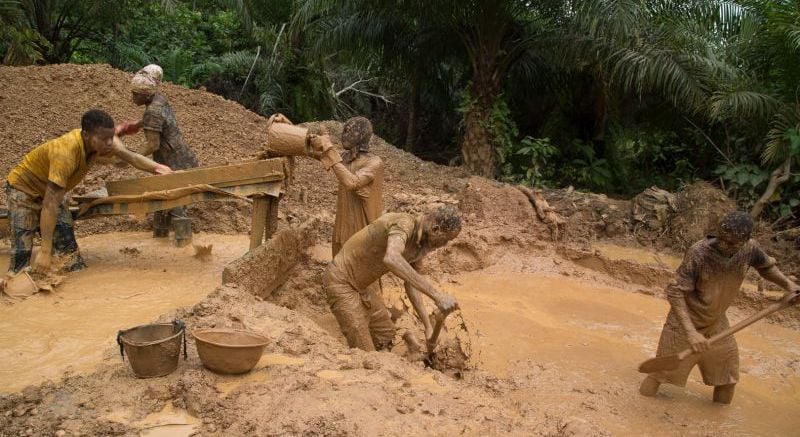By: Jon Spaull
Send to a friend
The details you provide on this page will not be used to send unsolicited email, and will not be sold to a 3rd party. See privacy policy.
Driving through the dense bush of Ghana’s Ashanti region, the first sign of the gold miners was the tell-tale chugging of their water pumps, followed by a clearing revealing mounds of earth and muddy pits. Emerging from this wasteland, hard at work digging for gold, was a group of ‘galamseys’, the local name for small-scale artisanal gold miners, camouflaged head to toe by a layer of brown mud and sweat. This scene is repeated again and again across Ghana’s gold belt.
Over the past ten years, as the gold price soared, so the number of these miners has mushroomed across the country’s gold belt. Even with gold prices well below their peak, still more people are attracted to becoming galamseys. Most are unregistered, mining illegally. Over 30 per cent of the gold produced in Ghana comes from these artisanal miners — more than any one of the large-scale multinational mines.
The criminalisation of the miners has done nothing to shut them down, creating instead a parallel economy where many profit from its illegality, including corrupt policemen and tribal chiefs.
Jon Spaull
Many of the galamseys are also farmers, sometimes chopping down their cacao trees, the main cash crop here, to clear the land for mining. They often mine riverbeds and use mercury to extract the gold, not appreciating the danger of this toxic metal on their health and the environment. One galamsey told me he took vitamin C tablets to treat the symptoms of mercury poisoning. There is a pressing need for more research on the long-term impact of mercury and other heavy metals on those living in the gold belt regions. The effect of dredging the riverbeds can be seen hundreds of miles downstream in the muddy brown waters carried out to sea.
The president of Ghana has declared a crackdown on the galamseys. The government has staged several well-rehearsed military operations in the area, confiscating equipment. But does the government really want to wipe out an industry that earns millions of dollars for the country? Similar to the prohibition of alcohol in the twentieth century and the ongoing war on drugs in the United States, the criminalisation of the miners has done nothing to shut them down, creating instead a parallel economy where many profit from its illegality, including corrupt policemen and tribal chiefs.
The galamseys are often demonised by the media in Ghana, yet the proceeds of mining provide poor communities with much needed income — like Mark, a galamsey I met, who was mining to pay for his children’s education. All the income generated also goes back to the community as opposed to the multinational mining companies where the majority of profits are repatriated.
All around, the environmental impact of illegal mining is clear, but criminalising the galamseys is obviously not working, exacerbating corruption and allowing them to disregard the environmental consequences. What is surely needed is to bring the galamseys into the regulated sector so that they can be monitored and the impact of their work minimised.Jon Spaull was investigating the issue of galamsey gold mining in Ghana for a short film that will be published by SciDev.Net later in the year.














